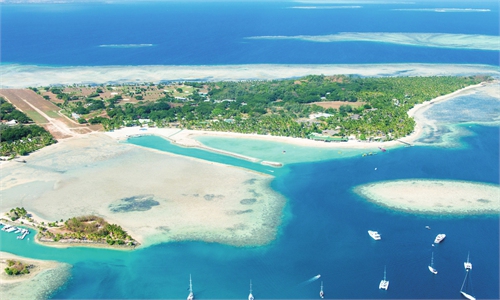The residual poison of ecological colonialism in climate issues

Illustration:Liu Rui/GT
On the last day of my recent trip to Nairobi, I visited the United Nations Environment Programme headquarters, where a portrait of Wangari Maathai caught my attention.
Her most famous initiative was the establishment of the landmark Green Belt Movement in 1977. The movement began by organizing women in rural Kenya to plant trees. By 2004, it had planted over 30 million trees in Kenya and later expanded to other African countries, creating significant environmental impact.
While I knew she was the first African woman to receive the Nobel Peace Prize in 2004, I was relatively unfamiliar with her groundbreaking contributions to environmental thought.
As our guide explained, one of her most significant theoretical contributions was establishing the profound connection between ecological destruction and colonialism - a framework that remains remarkably relevant today.
Maathai's concept of ecological colonialism illuminated how environmental exploitation serves as both a tool and a consequence of colonial domination. She argues that colonialism operates not just through political and economic control, but also through systematic environmental degradation that disrupts traditional relationships between local communities and their natural resources.
This framework helps explain how colonial powers maintain their dominance through environmental control, from forest clearing and animal slaughter to agricultural transformation.
Her analysis is particularly innovative in linking environmental degradation to broader systems of power and inequality. She demonstrates how colonial resource extraction practices create lasting ecological damage while undermining local communities' traditional environmental knowledge and management systems.
This dual destruction, of both natural resources and indigenous knowledge systems, creates cycles of dependency that persist long after formal colonialism has ended.
My visit to Masai Mara vividly illustrated these theoretical insights. The region's history of colonial big-game hunting offers a striking example of ecological colonialism in practice. Perhaps the most notorious case was former US president Theodore Roosevelt's African expedition from 1909 to 1911, undertaken after his presidency under the guise of scientific collection for the Smithsonian Institution. This "scientific expedition" resulted in the killing of approximately 11,400 animals, including thousands of large mammals.
The Roosevelt expedition exemplified how colonial powers often used "science" to justify environmental exploitation. While the expedition did contribute to zoological knowledge, its scale of destruction and its underlying assumptions about Western rights to African resources perfectly embodied the concept of ecological colonialism.
The expedition's dual nature, simultaneously advancing scientific knowledge while demonstrating colonial power through environmental exploitation, highlights the complex relationship between modern knowledge production and colonial practices.
Ecological colonialism is often linked to a mind-set where certain groups see themselves as "superior civilizations," which gives them the right to control and exploit other regions and living beings. This attitude leads to the plundering of natural resources and the destruction of the ecological environment. Standing before Maathai's portrait at UNEP, I realized how her theoretical framework offers vital insights into modern environmental challenges.
Today's global environmental crisis often reflects similar patterns of power and exploitation that Maathai identified in colonial practices. Developing nations, usually former colonies, bear disproportionate burdens of climate change despite historically contributing the least to the problem.Maathai's insights remind us that adequate environmental protection must address underlying power structures and inequalities.
This historical dominance of Western colonizers gives those old colonial countries an advantage in climate negotiations, standard-setting, and the corresponding allocation of resources and environmental market tools.
In recent years, many of the conflicts between Southern and Northern countries over climate issues have been influenced by ecological colonialism, all involving a struggle for dominance. Removing the effects of ecological colonialism remains a difficult task in the future.
The author is a senior editor with People's Daily, and currently a senior fellow with the Chongyang Institute for Financial Studies at Renmin University of China. dinggang@globaltimes.com.cn. Follow him on Twitter @dinggangchina




